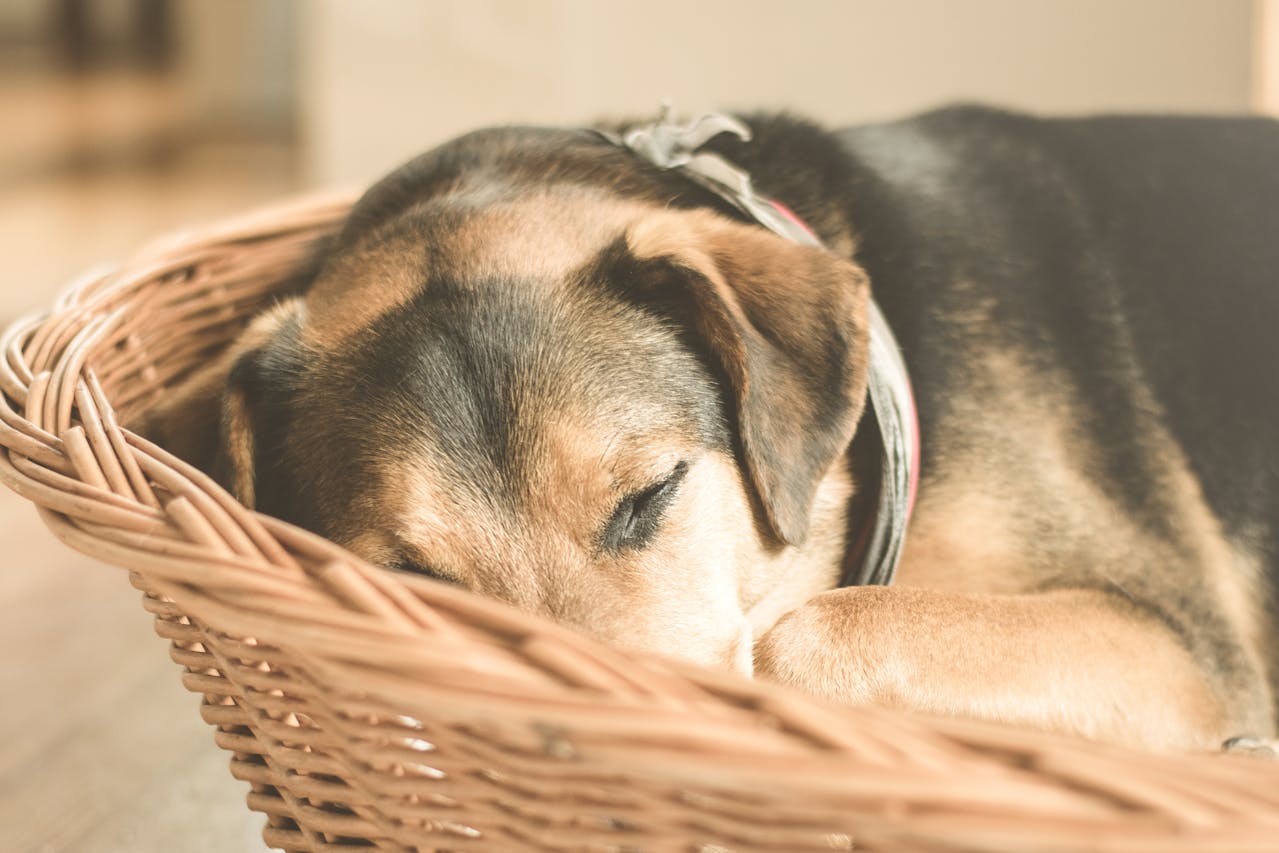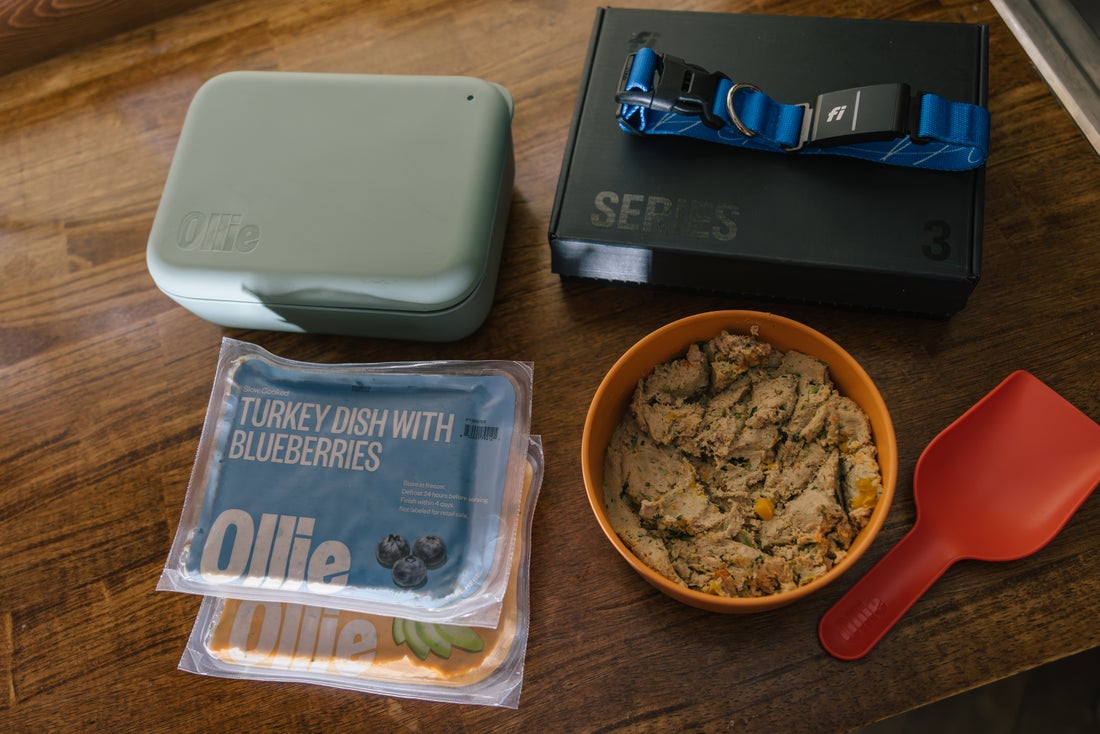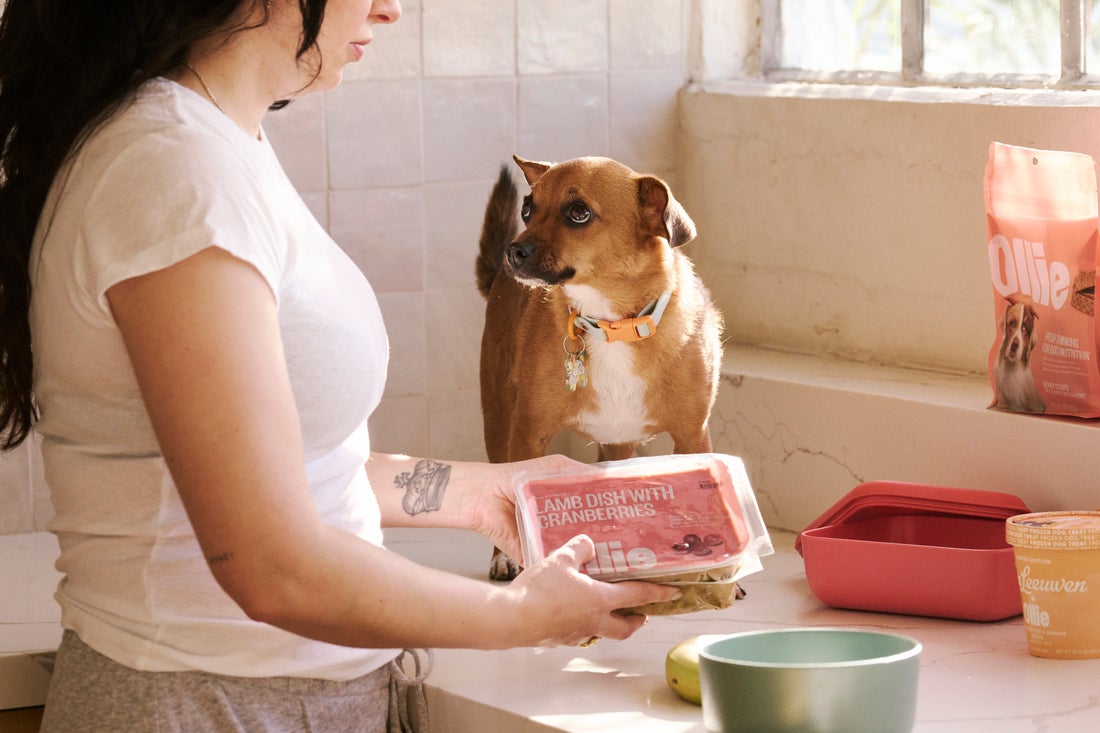Hey Ollie blog readers! We’re offering you an exclusive 60% OFF your starter box! Try now!
If your dog has been experiencing persistent diarrhea or stomach upset, Giardia could be the culprit. This microscopic parasite infects the intestines and can cause digestive issues, weight loss, and dehydration. It spreads easily through contaminated water, food, or direct contact with infected feces, making it a common concern for pet parents.
While Giardia can be uncomfortable and sometimes tricky to diagnose, the good news is that it’s treatable with proper veterinary care. In this guide, we’ll cover everything you need to know about Giardia in dogs—including symptoms, treatment options, and how to prevent reinfection.
Did you know? A healthy diet can help support your dog’s immune system and recovery from Giardia. Ollie human-grade meals provide high-quality nutrition with real ingredients, helping your pup stay strong and healthy.
Key Takeaways
- Giardia is a common intestinal parasite that can cause diarrhea, weight loss, and dehydration in dogs.
- It spreads through contaminated water, food, or contact with infected feces, making it highly contagious in shared dog spaces like parks and kennels.
- A strong immune system and a healthy diet, like Ollie’s fresh dog food recipes, can help support your dog’s recovery and overall gut health.
What is Giardia in Dogs?
Giardia is a microscopic parasite that infects a dog’s intestines, leading to digestive issues like diarrhea, weight loss, and dehydration. It spreads through contaminated water, food, soil, or direct contact with infected feces. Even dogs that appear healthy can carry and spread Giardia without showing symptoms.
How Do Dogs Get Giardia?
Dogs contract Giardia by ingesting Giardia cysts, which are hardy forms of the parasite found in the environment. Common sources of infection include:
- Drinking from contaminated water sources (puddles, lakes, shared dog bowls).
- Eating or sniffing infected feces from another dog or wild animal.
- Licking contaminated surfaces (such as unclean food bowls or toys).
- Grooming themselves after contact with an infected surface.
Once inside the body, Giardia multiplies in the intestines, leading to irritation and poor nutrient absorption.
Giardia Symptoms in Dogs
Giardia affects the digestive system, and its most common symptom is diarrhea. However, symptoms can vary—some dogs may show no signs at all, while others experience severe stomach upset and dehydration.
Common Symptoms of Giardia in Dogs
- Watery, foul-smelling diarrhea (often pale or greasy-looking)
- Intermittent or chronic diarrhea that comes and goes
- Vomiting (less common but possible)
- Weight loss due to poor nutrient absorption
- Dehydration from fluid loss
- Lethargy or low energy levels
- Excessive gas or bloating
Can a Dog Have Giardia Without Symptoms?
Yes! Some dogs can be asymptomatic carriers, meaning they have Giardia but show no outward signs of illness. However, they can still spread the parasite to other pets through their stool. This is why regular vet checkups and good hygiene practices are important.
How is Giardia Diagnosed?
Since Giardia is microscopic and not always present in every stool sample, diagnosing it can be tricky. If your vet suspects Giardia, they will use specialized tests to confirm the infection.
Common Diagnostic Tests for Giardia
- Fecal Smear – A small sample of stool is examined under a microscope for Giardia cysts. However, cysts aren’t always present, so this test alone may not be conclusive.
- Fecal Floatation Test – The stool sample is mixed with a special solution to make Giardia cysts float, making them easier to detect.
- ELISA (Enzyme-Linked Immunosorbent Assay) Test – A more sensitive test that detects Giardia proteins in a stool sample, even if cysts are not visible under a microscope.
- Multiple Stool Samples – Since Giardia doesn’t always shed in every bowel movement, vets may request samples from multiple days to improve detection accuracy.
When Should You See a Vet?
If your dog has persistent diarrhea, weight loss, or signs of dehydration, it’s important to get them tested for Giardia. Early diagnosis and treatment help prevent further health complications and spreading the parasite to other pets.
Giardia in Dogs Treatment
If your dog is diagnosed with Giardia, your vet will prescribe medication to eliminate the parasite and stop the infection from spreading. Giardia won’t go away on its own, so proper treatment is essential.
Common Medications for Giardia in Dogs
Metronidazole – One of the most commonly prescribed antibiotics for Giardia. It helps eliminate the parasite and reduces inflammation in the intestines.
Fenbendazole – Another medication often used, especially in puppies or dogs who don’t respond well to metronidazole.
Most dogs recover within 5–7 days of treatment, but severe cases may require a longer course of medication. Your vet may also recommend probiotics and a bland diet to help restore gut health during recovery.
Additional Care During Treatment
- Keep your dog hydrated – Diarrhea can cause fluid loss, so always provide fresh, clean water.
- Feed a gentle, nutritious diet – Easily digestible foods support recovery. Ollie’s fresh, human-grade meals are a great option because they provide high-quality, gut-friendly nutrition without fillers or artificial ingredients.
- Clean your dog’s living space – Giardia spreads through contaminated surfaces. Wash bedding, food bowls, and toys regularly.
Re-testing After Treatment
Your vet may recommend a follow-up stool test to ensure the infection is fully cleared. Some dogs require a second round of treatment if Giardia persists.
Is Giardia Contagious to Humans and Other Pets?
Yes, Giardia is highly contagious and can spread between dogs, other pets, and even humans in some cases. While the risk of human infection is lower, it’s still important to practice good hygiene to prevent transmission.
Can Humans Get Giardia from Dogs?
Giardia is zoonotic, meaning it can spread from animals to humans, though it’s uncommon. People typically contract Giardia from contaminated water or food, but direct contact with infected dog feces could pose a risk. Symptoms in humans include diarrhea, nausea, and stomach cramps.
Can Other Pets Get Giardia?
Yes! Giardia can spread between dogs and cats in the same household, as well as to other animals. If one pet has Giardia, it’s a good idea to monitor other pets for symptoms and practice strict hygiene.
How to Prevent Giardia in Dogs
Since Giardia spreads easily, prevention is key to keeping your pup safe. By following good hygiene practices and supporting your dog’s immune health, you can lower the risk of infection.
1. Provide Clean, Fresh Water
- Always offer fresh, filtered water to prevent your dog from drinking contaminated sources.
- Avoid standing water (puddles, lakes, shared dog park bowls) where Giardia may be present.
- When hiking or traveling, bring a portable water bowl and fresh water for your pup.
2. Practice Good Hygiene
- Pick up waste immediately to prevent the spread of Giardia in your yard or at the park.
- Wash food and water bowls daily to remove any lingering bacteria or parasites.
- Bathe your dog regularly, especially if they’ve had Giardia or have been around infected pets.
3. Disinfect Your Dog’s Living Space
- Wash bedding, toys, and collars in hot water after a Giardia infection.
- Use a pet-safe disinfectant on floors and surfaces to kill any remaining parasites.
4. Support Your Dog’s Gut Health
A strong digestive system makes it harder for parasites to take hold. Feeding your pup a fresh, high-quality diet, like Ollie’s human-grade meals, helps maintain a healthy gut and strong immune system.
5. Regular Vet Checkups
- Routine stool tests can help detect Giardia before symptoms appear.
- If your dog has had Giardia before, ask your vet about probiotics or digestive supplements to aid gut health.
Final Thoughts on Giardia For Dogs
Giardia is a common but treatable parasite that can cause digestive issues, dehydration, and weight loss in dogs. Since it spreads easily through contaminated water, food, and feces, prevention and early detection are key.
If your dog shows signs of Giardia, such as diarrhea, vomiting, or lethargy, consult your vet for testing and treatment. Medications like metronidazole or fenbendazole can help clear the infection, but proper hygiene and a strong immune system are essential for full recovery.
Supporting your dog’s gut health with high-quality nutrition can make a big difference. Ollie’s fresh, human-grade meals are crafted with digestive-friendly ingredients to help your pup recover and stay strong against future infections.
By keeping your dog’s environment clean, providing fresh water, and feeding a balanced diet, you can help prevent Giardia and keep your pup happy and healthy.
Frequently Asked Questions About Giardia in Dogs
How do dogs get Giardia?
Dogs contract Giardia by ingesting contaminated water, food, or feces. Common sources include puddles, lakes, shared dog park water bowls, and dirty surfaces.
Can I get Giardia from my dog?
While rare, Giardia is zoonotic, meaning it can spread to humans through contact with contaminated feces or water. Practicing good hygiene, like washing hands after handling your dog’s waste, helps reduce the risk.
How long does it take for Giardia to go away in dogs?
With proper medication and care, most dogs recover within 5-7 days. However, some cases require a second round of treatment if symptoms persist.
Can Giardia go away on its own in dogs?
Some mild cases may resolve on their own, but many require veterinary treatment to prevent chronic infections and reinfection.
How can I help my dog recover from Giardia?
- Follow your vet’s treatment plan and complete all prescribed medication.
- Keep your dog hydrated to prevent dehydration from diarrhea.
- Feed a gut-friendly diet—easily digestible, high-quality meals like Ollie’s fresh, human-grade food can support digestion and immune health.
- Clean your dog’s environment (bowls, bedding, and toys) to prevent reinfection.
How do I prevent my dog from getting Giardia again?
Provide clean drinking water, pick up waste immediately, and feed a high-quality diet to support overall gut health.
Tagged As:

The nutrition your dog needs,
the food they want.

Enjoying our articles? Subscribe our Newsletters and get new articles directly to your inbox
You might also like
18 September 2025
5 MINS READ
Can I Rotate Fresh Dog Food Flavors?
Yes, it’s safe to rotate fresh dog food flavors, and many dogs actually benefit from the variety. At Ollie, we offer multiple fresh recipes, like Beef, Chicken, Turkey, Lamb, and Pork so you can…
by Ollie Pets
18 September 2025
5 MINS READ
Is Fresh Dog Food Safe During Power Outages?
Fresh dog food is only safe during a power outage if it has stayed cold, specifically, below 40°F. Once the temperature rises above that point, bacteria can start to grow, and the food may no lon…
by Ollie Pets
18 September 2025
5 MINS READ
How Do I Store Fresh Dog Food While Traveling?
If you’re bringing fresh dog food on the road, keeping it cold is key. The best way to store it is in a cooler with ice packs or a travel freezer. At Ollie, our vacuum-sealed fresh food stays good…
by Ollie Pets







